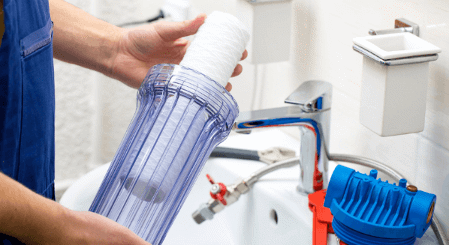The water you use in your household comes from a natural source flowing through the Earth and into the treatment center that supplies water to your community. Although it has been processed before being distributed, the water may still contain dirt, chemicals, and other contaminants.
Nobody wants to drink or use water that is cloudy or has an unpleasant odor and taste. As an extra precaution, water filtration systems are used by some households. Simply put, they are used to ensure that the water is safe for drinking, cooking, bathing, and cleaning.
If you’re wondering how water filtration works, read on as we walk you through the process!
What is Water Filtration?
Before we discuss how water filtration works, let us first discuss what water filtration is. Water filtration is the process of removing undesirable elements including tiny particles or microscopic contaminants to extract cleaner water.
There are various types of home water filtration systems. Regardless of the size or brand, they typically use both physical and chemical filtration methods to make your home’s water supply safer to use.
How Do Water Filtration Systems Work?
Residential water filtration systems use filters that block even small particles such as sand and bacteria.
The first phase of the process involves physical filtration. In this step, the water passes through a filter that serves as a barrier that prevents debris from passing through. This filter needs to be replaced regularly to ensure that these unwanted particles are filtered out.
After the physical filtration, the next phase involves chemical filtration. As the name suggests, a chemical reaction is created as water passes through an activated substance such as charcoal.
The beauty of chemical filtration is that it helps remove microscopic impurities that managed to sneak through the filters during the initial physical filtration phase.
While materials may vary from one type of water filtration system to another, the concept stays the same– physical and chemical filtration work together to improve water quality.
Enjoy Cleaner Water By Installing a Water Filtration System
Although water quality depends on where you live and where your water is coming from, your tap water likely only meets the minimum standards set by the EPA.
Having your own water filtration system at home can provide extra protection and eliminates harmful substances, bacteria, and viruses that may endanger your family’s health.
So if you want to improve the taste, smell, and safety of the water you use in your household, get in touch with us at Rebel Refrigeration today! We can provide expert insight into the most suitable filtration system to install based on your specific situation. We also offer different types of water filtration systems to cater to your needs, including activated carbon filters, whole-home reverse osmosis units, and point-of-use reverse osmosis units.
All of these effectively remove chlorine, bacteria, chemicals, and other contaminants that can make you and your family sick. Additionally, high-quality home water filtration systems can eliminate heavy metals such as lead, which are associated with various kinds of cancer.
Do you want to confirm if your water quality is up to standards? Book a consultation with one of our experts today. Give us a call at (702) 766-9436 or contact us here!

